The World Health Organisation has declared a new coronavirus variant to be "of concern" and named it Omicron, but a virologist tells RNZ's Saturday Morning it is too early to know if it will be more dangerous than existing variants like Delta.

Photo: 123rf
Cambridge University consultant clinical virologist Dr Chris Smith talked to RNZ's Kim Hill about what Omicron might mean.
"It's a variant of concern, which basically means it goes up a notch in how we deal with it, but it doesn't mean it's a foregone conclusion it's going to be a problem."
In today's Covid-19 update, the Ministry of Health said it was monitoring the Omicron variant.
"This particular strain is in its infancy and as with any emerging developments to do with Covid-19 we are closely watching and monitoring evidence and countries' responses," the Ministry said in its statement.
"We will advise on any potential impacts for New Zealand, noting that we remain in a good position to minimise the impact of any new variants with isolation and routine testing of international arrivals."
The WHO said the variant had a large number of mutations, and early evidence suggested a possible increased risk of reinfection.
It was first reported to the WHO from South Africa on 24 November, and has also been identified in Botswana, Belgium, Hong Kong and Israel.
Several countries have now banned travel from southern Africa.
Dr Smith said people should recognise there is no guarantee Omicron would be another Delta.
"I'd just like to reassure everybody at this stage we don't know very much about this thing other than it's been detected.
"It's been detected in a number of places, it's been detected, spreading a bit, although we don't know the scale of that yet.
"It's also showing a number of changes which might - we don't know yet - which might undermine the protective abilities of the vaccine, and might confer upon it additional behaviours like greater ability to spread, greater ability to cause serious disease.
"At the moment, we don't know."
Dr Smith said studying differences in the variant's genetic code will determine much about it.
"That's what first rang alarm bells, because this one has got quite a few changes, genetic changes.
"Now all viruses have genetic changes, they're all different in some way, and in many instances, those changes make absolutely no difference to the behaviour of the virus. They're just silent changes."
"But in this particular one, the Omicron variant, there are about 30 changes which cluster around the spike region of the virus.
"Now remember the reason we call these viruses coronaviruses is because they look like a crown, because they have bits sticking up from the surface that resemble a crown, those are the spikes, that's how the virus gets into our cells and invades us.
"So if you get changes in that part of the virus it can change the way the virus gets a hold of your cells, it can therefore change the efficiency with which it gets into your cells, which has implications for the infectious dose, which has implications for the infectivity and transmissibility."

Photo: 123rf
Scientists will study how those changes will manifest and see how likely it is the Omicron variant could slip by current vaccines.
"Those experiments are not hard to do and I guarantee they're underway in laboratories in many places right now," Dr Smith said.
Scientists are constantly looking at emerging variants and how they might pan out.
Detecting virus variants earlier and earlier has dramatically improved over the course of the pandemic, he said.
The work scientists are doing will try to find out if Omicron could be less affected by vaccines than the Delta variant and others.
"We don't know that it can (breach vaccine protection), we don't think that it will."
Professor Michael Baker from Otago University said it is very unlikely a new variant would be able to suddenly evade the vaccine entirely.
"This is not a new problem. It's just given the scale of this pandemic and the seriousness of the infection it would be a major disaster if we had a variant that had significant ability to evade our vaccines."
Immunologist Professor Miguel Quiñones-Mateu of the University of Otago said he thought it would be hard for Omicron to evolve to avoid vaccines.
"Is this the one we all have been afraid of? That is, a highly transmissible, vaccine escape, more virulent variant?
"Personally, I think it will be difficult for the virus to evolve/select for this trifecta. However, having a canvas of 8 billion people to explore, who knows, it may be just a matter of time."
A virus's job is to continue mutating, Dr Smith said.
"It will keep on boiling up and bubbling up until it basically runs out of room to manoeuvre."
Some scientists think that may already be happening with Covid-19, Dr Smith said.
"It's hard to envisage that it's going to change much more, because if it changes much more it begins to have to sacrifice things in order to stay one step ahead.
"In evolutionary terms if a virus is too nasty then in fact it's shooting itself in the foot because it wipes out its hosts. It then finds itself spreading less efficiently.
"A virus doesn't have thoughts, feelings and wishes, but we can sort of anthropomorphise it a bit and we can say what the virus wants is to spread as far and wide and have as many coronaviruses, babies, as possible. It doesn't do that by killing off its hosts.
"Over time viruses and their hosts co-evolve and they make a series of trade-offs so that they become better bedfellows. And this has been happening for millions of years."

Photo: AFP or licensors
Travel bans may not help - Dr Smith
South Africa's Health Minister Joe Phaahla told reporters that the flight bans were "unjustified".
"The reaction of some of the countries, in terms of imposing travel bans, and such measures, are completely against the norms and standards as guided by the World Health Organisation," he said.
The World Health Organization has warned countries not to hastily impose travel restrictions, but many already have.
Dr Smith said a short time after Delta emerged, it was detected in more than 50 countries which meant travel bans weren't much help.
"So actually shutting the borders to one meant that you were basically cutting off your nose despite your face because it just comes in from one of the 50 others and that is exactly what's going to happen here."
It was accepted the virus would continue to spread and mutate, but government restrictions helped to slow it down and buy time.
"It enables us to reinforce vaccination because most people are pretty optimistic that the vaccines will continue to work quite well, it's just a question of maintaining high levels of immunity.
That time also enabled scientists to learn more about the new variant and the threat it could pose.
"Hopefully we will know quite soon if it is a major threat or not and the governments of various countries can make an appropriate decision."
- RNZ with BBC





